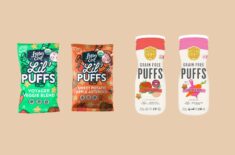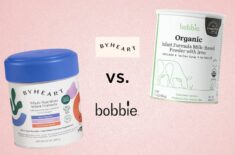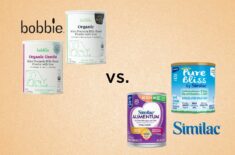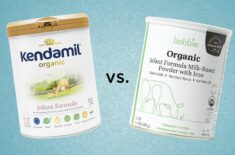Overview
The first year of your baby’s life can be the most exciting and challenging, especially if you’re a first-time parent. You have to deal with a lot of unknowns, and you probably have a lot of questions to ask.
You might be concerned about breastfeeding or choosing the right formula and baby foods. Perhaps you’re also wondering when your baby should start solids.
That’s a common question for many new parents. So we prepared this handy age-by-age guide to feeding your little one.
Eating solid foods is a big milestone in your baby’s life. But you can’t just start anytime you want. You’ll also have to check with your pediatrician first and also make sure your baby is displaying signs of readiness.
Is it alright to feed your baby if they’re still two months old? How about three or four months old? Do you need pureed foods, or can your baby eat anything you can? What allergenic foods should you avoid? Find answers to these questions below.
When Can Babies Eat Baby Food?
The AAP (the American Academy Of Pediatrics) recommends exclusive breastfeeding for the first six months of life. But some babies develop faster than others and might be ready for solid foods even if they’re younger. (1)
Talk to your pediatrician about starting solids if your child is under six months old.
When Can Babies Drink Water?
Most babies are cleared by their pediatricians to start taking sips of water around six months of age. But it’s not recommended to give your baby water until you’ve gotten the go-ahead from your doctor.
During mealtimes, offer water in a sippy cupto help your child start practicing drinking from a cup or glass.
A Month-By-Month Guide For Introducing Solids To Your Baby
Here’s a handy guide on when babies can eat food and what you should do.
Age: Birth
Foods to Feed
- Breast milk or formula only
- Make sure to consult your pediatrician before starting your child on infant formula.
Feeding Behavior
- Your baby’s rooting reflex helps them take nourishment from the nipple (on mommy’s breast or a baby bottle).
- The tongue-thrust reflex also prevents food introduction at this age.
How Much To Feed
- Your baby might only need around 1-2 oz per feeding every 2-3 hours during the first week, although this will vary based on baby’s weight and other factors.
- They might need 2-4 oz per feeding every 3-4 hours from two weeks to the end of the first month.
Signs Of Readiness
- None
Feeding Tips
- Some parents might follow a regular feeding schedule, while others feed on demand.
- Your baby’s digestive tract is still developing and isn’t ready to digest solid foods yet.
- Don’t give baby solid foods.
Age: One Month
Foods to Feed
- Breast milk or formula only
Feeding Behavior
- Your baby’s tongue-thrust reflex prevents food introduction at this age.
- They’re still not ready for any solid foods.
How Much To Feed
- Around 4 oz every 3-4 hours, although this will vary based on your baby’s weight and other factors.
Signs Of Readiness
- None
Feeding Tips
- You can continue feeding on demand.
Age: Two Months
Can I Give My 2-Month-Old Baby Food?
- No. Your 2-month-old baby isn’t ready for any solid foods yet.
- Give them breast milk or formula only.
Feeding Behavior
- The tongue-thrust reflex is still in place at this age, preventing solid food introduction.
How Much To Feed
- Around 4-5 oz every 3-4 hours, although this will vary based on your baby’s weight and other factors.
Signs Of Readiness
- None
Feeding Tips
- Don’t overfeed your baby.
- Though you might want them to grow faster, you also have to make sure they remain within the healthy weight ranges for their age.
Age: Three Months
Can I Give My 3-Month-Old Baby Food?
No. The AAP recommends introducing your baby to solid foods when they’re at least six months old. Continue with exclusive breastfeeding, or you can introduce infant formula with your pediatrician’s approval. (2)
Can I Give My 3-Month Old-Gerber Baby Food?
No. Your child’s tummy is still developing at this age and isn’t ready for digesting solid foods, even in purée form. Instead of giving them Gerber baby food, you can opt for Gerber Good Start baby formulas.
Can I Give My 3-Month-Old Mashed Banana?
No. While bananas can be a convenient option for your baby’s first food, they can’t be digested by a 3-month-old baby’s still-developing tummy.
Can I Give My 3-Month-Old Banana Baby Food?
No. Aside from being unable to digest bananas, your baby’s tongue-thrust reflex prevents food introduction at this age. Their tongues are likely to reject even pureed baby foods.
Can You Give Baby Oatmeal At 3 Months?
No. Although oatmeal may be a healthier choice than rice cereal, your 3-month-old baby’s tummy is still developing and can’t digest this food.
Can I Give My 3-Month-Old Baby Cereal In Bottle?
No. Aside from being unable to swallow or digest food at this age, the CDC (Centers for Disease Control and Prevention) warns that this can be a choking hazard. (3)
Don’t put cereals in your baby’s bottle unless it’s with your pediatrician’s approval (such as in cases of spit-up).
Can I Give My 3-Month-Old Sweet Potatoes?
No. Superfoods like sweet potatoes are healthy foods you can give your baby, but they aren’t suitable for a 3-month-old baby’s still-developing tummy.
You can start giving this food at four months of age with your pediatrician’s approval and if they’re displaying signs of readiness.
Can I Give My 3-Month-Old Mashed Potatoes?
No. They might be easy to prepare, but your baby’s still-developing tummy can’t handle foods yet.
Foods to Feed
- Exclusive breast milk or formula
Feeding Behavior
- They might start showing interest in food, but their tongue-thrust reflex is likely to keep food out of their mouths.
How Much To Feed
- Around 4-5 oz every 3-4 hours, but possibly longer stretches at night. However, this will vary based on your baby’s weight and other factors.
Signs Of Readiness
Your baby may start to:
- Show interest in food
- Slowly develop head control
Feeding Tips
- Continue to feed on demand.
- You don’t have to wake your little ones up to feed in the middle of the night because they might start to sleep longer in between feedings. This will depend on various factors such as their weight, though.
Age: Four Months
Can I Give My 4-Month-Old Baby Food?
Yes. You may start your baby on solid foods at four months of age as long as they’re ready. (2)
But be sure to consult with your little one’s pediatrician before giving your baby’s first food.
What Are Signs Of Readiness For Baby Food?
- Can sit without support
- Good head control (can hold neck and head upright and steady without support)
- Puts objects to their mouth
- Shows desire for food (leaning forward or opening mouth upon seeing food)
- Loss of tongue-thrust reflex (sticking tongue out to push food or other objects from their mouth)
- Transfers food to the back of their mouth
What Solid Food Options Can I Give My 4-Month-Old?
Some examples of first foods you can give your baby based on AAP recommendations: (2)
Meat or other proteins
- Beef
- Poultry
- Low-mercury fish
Fruits
Vegetables
- Squash
- Eggplants
- Spinach
Grains
- Oats
What Snacks Can A 4-Month-Old Eat?
If your child is ready, you can give them a variety of foods for meals or snacks.
But it can be a good idea to stick to single-ingredient foods during their first month of eating solids.
Yumi Stage 1 single-ingredient purees may be ideal for first-time eaters because they have a thinner consistency than other stages. They’re high-quality pre-made baby foods that are delivered to your door.
What Should Babies Eat At 4 Months?
Though you can pick the foods you want to give your baby, your pediatrician might advise you to start with vegetables and other healthier foods before introducing sweets.
Iron is an essential nutrient your baby can get from breast milk or formula. But your child might not get enough once you start on solids.
That’s why you should try to pick iron-rich foods like red meats, eggs, dark green leafy vegetables, green beans, lentils, and poultry. (4)
Can I Feed My Baby Rice Cereal At 4 Months?
Rice cereal is gluten-free and has a lower likelihood of causing an allergic reaction than oats or oatmeal cereal. But it may contain a high level of arsenic and other toxic heavy metals.
So, we don’t recommend giving your child rice cereal as the main introductory food source.
What Food Do You Introduce To Baby First?
According to the AAP, you don’t need to introduce foods to your baby in a certain order. You can give them a variety of foods. (2)
Feeding Behavior
- It’s an exploratory stage, so your baby might just try tasting the food without actually eating much.
- Gagging might be common at this age. Your baby’s reflex system can help against choking and suffocation. (5)
How Much To Feed
- Around 4-6 oz of formula every 3-4 hours, but with longer stretches at night. However, this will vary based on your baby’s weight and other factors.
- Around 1-2 tablespoons of food (for spoon-fed babies)
- As much as your child likes (for baby-led weaning)
Feeding Tips
- Don’t expect your child to eat plenty of food at this stage.
- Continue giving your child breast milk or formula.
- You can start introducing your baby to a sippy cup.
How To Introduce First Foods
Many parents start with single-grain cereals and pureed vegetables or fruits as their baby’s first foods.
We don’t recommend starting your baby’s food journey with infant cereal, though. These cereals are highly processed and often full of questionable ingredients. Instead, try feeding them whole foods such as avocado, banana, zucchini, and butternut squash.
When introducing solids, you can start by letting your child taste a small amount of a single-ingredient food, such as bananas.
As your child becomes accustomed to food, you can introduce pureed meats and gradually introduce small pieces of fruits, vegetables, and meats.
You can also opt to do baby-led weaning, a feeding method that lets your child choose the finger foods they want to eat. Your child determines what, when, and how much they will eat.
But do ensure you talk to your pediatrician before starting your child on solids, especially if you’re planning to follow baby-led weaning.
Foods To Avoid
- Sweet treats
- Fruit juices
- Foods with added sugars
- Raw vegetables
- Pure cow’s milk (may have bacteria like E. coli and Salmonella that can be dangerous to your baby) (6)
- Honey (may cause botulism, a serious illness) (7)
- Choking hazards (hard, chunky foods such as meat and hot dogs)
Many parents avoid common allergens (such as tree nuts, fish, seafood, milk, and eggs, especially if they have any family history of allergies.
But studies show that the early introduction of allergens may actually help prevent food allergies. (8)
Age: Five Months To One Year
Foods to Feed
- Chunkier cuts (but watch out for choking hazards)
- Thicker vegetable or fruit purees, such as Yumi Stage Two
- Meat purees
- More textures and flavors
Feeding Behavior
- If your child isn’t eating solid foods yet, they might start showing signs of readiness at five months of age.
- If they were introduced to food the previous month, they’re likely to eat more of it now.
- Ready for finger foods
How Much To Feed
- Around 6-8 oz of baby formula every 4-5 hours, although this will vary based on your baby’s weight and other factors.
- As much food as your baby needs
Signs Of Readiness
- They’ll show the same readiness signs mentioned above.
Signs They’re Full
- Moving food away or out their high-chair tray
- Refusing to open their mouth (for spoon-fed babies)
- Pushing spoon or food away (for spoon-fed babies)
Feeding Tips
- Put your child in a high chair and make sure to buckle up.
- A bib can also be useful in keeping some food mess off your baby.
- Choose baby-safe utensils that are small, soft, and BPA-free (bisphenol-A is a toxic chemical used in plastic manufacturing). We prefer food-grade silicone and stainless steel.
- Add more variety of foods to your baby’s diet.
Age: One Year And Above
Foods to Feed
These are some foods that are prohibited for younger children due to safety issues but may be introduced to those who are one year old and above: (5)
- Honey
- Cow’s milk
- Harder, chunkier foods like hot dogs
- Nuts and peanut butter (unless your child is allergic)
When Can I Give My Baby Juice?
You can give fruit juices once your baby is one year old. But it’s not recommended because of its high sugar content, which can cause obesity. (5)
Can Babies Eat Pizza?
It’s ideal to wait until your child is one year old before introducing pizza.
Feeding Behavior
- May be more willing to try other foods
How Much To Feed
- Around 7-8 oz of formula per feeding, although this will vary based on your baby’s weight and other factors.
Signs Of Readiness
- None
Feeding Tips
- The foods that young children are introduced to can help them develop their eating habits. So, try to avoid junk foods and sugary snacks in favor of healthy ones.
Age: Two Years of Age And Above
Foods to Feed
- Table food
Feeding Behavior
- Independent feeding
- Less likely to choke than younger children (but may still need some supervision during eating to avoid choking incidents)
How Much To Feed
- Depends on what they need
Signs Of Readiness
- None
Feeding Tips
- Limit intake of sweets, including fruit juices, to help avoid tooth decay.
FAQs
What Happens If You Feed A Child Too Early?
- Your child may be more prone to choking.
- The tongue-thrust reflex might prevent them from swallowing.
- Their digestive system may still be too young to digest these new foods.
What Allergenic Foods Should You Avoid?
Though studies show that early introduction of allergens may help prevent allergy development, seek advice from your pediatrician if your baby: (8)
- Already has a food allergy
- Has severe eczema (a condition that causes itchy, red skin)
- Family history of food allergy
REFERENCES
(1) https://www.cdc.gov/breastfeeding/faq/index.htm
(2) https://www.cdc.gov/nutrition/infantandtoddlernutrition/foods-and-drinks/when-to-introduce-solid-foods.html
(3) https://www.cdc.gov/nutrition/infantandtoddlernutrition/bottle-feeding/index.html
(4) https://www.cdc.gov/nutrition/infantandtoddlernutrition/bottle-feeding/index.html
(5) https://www.mayoclinic.org/healthy-lifestyle/infant-and-toddler-health/in-depth/healthy-baby/art-20046200
(6) https://www.cdc.gov/foodsafety/rawmilk/raw-milk-questions-and-answers.html
(7) https://kidshealth.org/en/parents/botulism.html
(8) https://www.ncbi.nlm.nih.gov/pmc/articles/PMC4046529/












